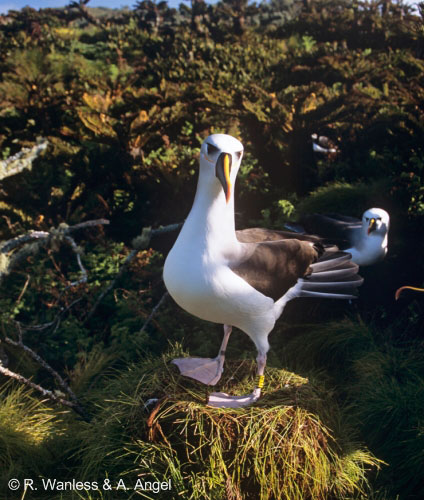Geoff Tuck (CSIRO Marine and Atmospheric Research, Hobart, Australia) and colleagues have analysed the deleterious effects of tuna fisheries in the Atlantic Ocean on the populations of four albatross species, publishing their findings in open access in the ICES Journal of Marine Science last month.
The paper's abstract follows:
"Currently, 17 of 22 albatross species are listed as Vulnerable, Endangered, or Critically Endangered by the International Union for the Conservation of Nature (IUCN). Incidental mortality in fisheries is by far the most widespread cause of the population declines observed for these and other closely related species. In 2006, the International Commission for the Conservation of Atlantic Tunas (ICCAT) requested an assessment of the threat from their fisheries to all seabirds that breed or forage within their jurisdiction. Methods were developed to assess the potential consequences of fishing for more than 60 populations of seabird. The assessment framework involved the identification of at-risk populations, overlap analyses, estimation of total bycatch, and an evaluation of the impact of the bycatch on key selected populations for which there were sufficient data on bird distribution and demography. These were the wandering and black-browed albatrosses of South Georgia, and the Atlantic yellow-nosed and Tristan albatrosses of Gough Island. Summary results from the seabird assessment are presented, revealing that ICCAT longline fisheries catch substantial numbers of seabirds, with potentially significant conservation implications. If this mortality is not reduced, the numbers of breeding birds in some populations will continue to decline, threatening their long-term viability."

Atlantic Yellow-nosed Albatross: at risk to tuna longliners
Reference:
Tuck, G.N., Phillips, R.A., Small, C., Thomson, R.B., Klaer, N.L., Taylor, F., Wanless, R.M. & Arrizabalaga, H. 2011. An assessment of seabird-fishery interactions in the Atlantic Ocean. ICES Journal of Marine Science 68: 1628-1637.
John Cooper, ACAP Information Officer, 1 October 2011

 English
English  Français
Français  Español
Español